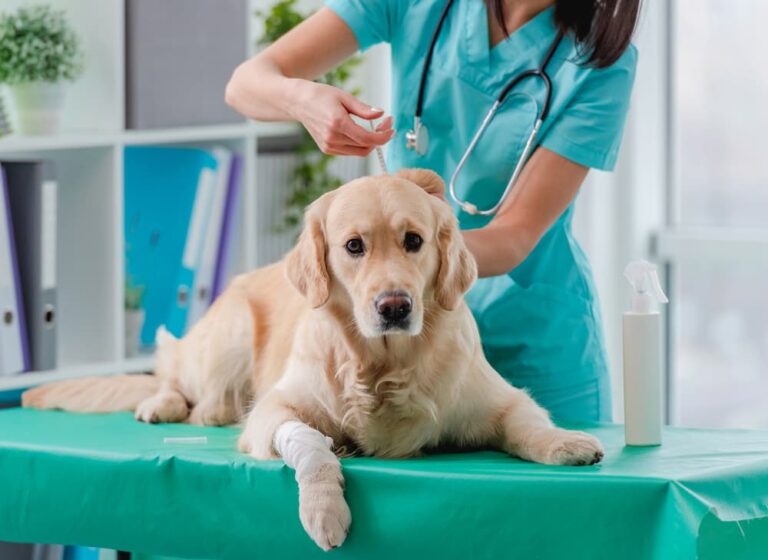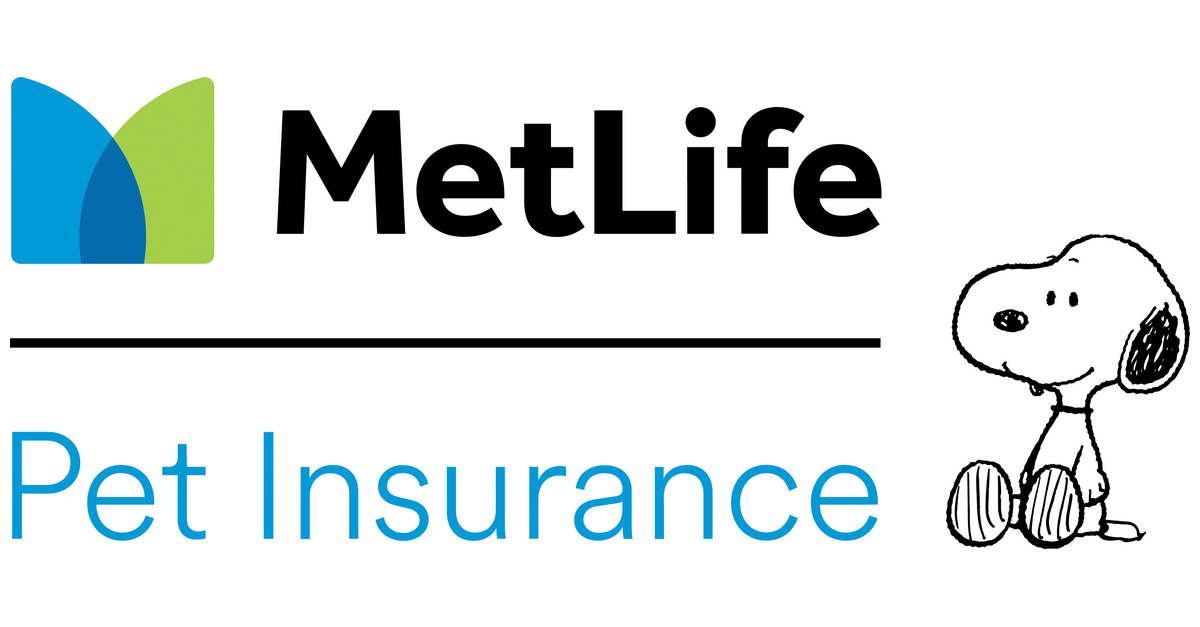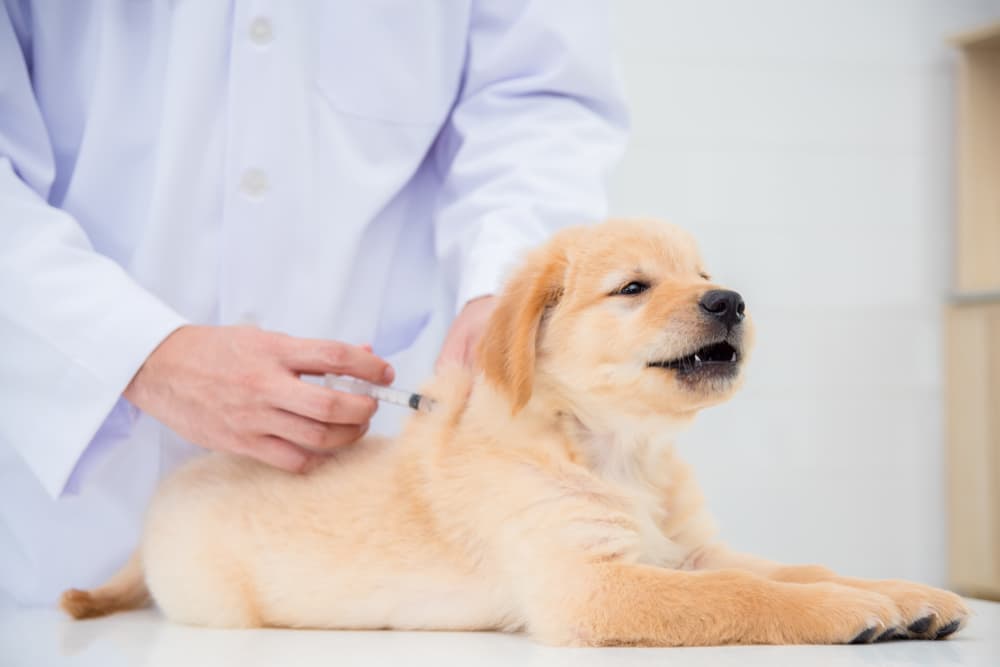Leptospirosis Vaccine for Dogs: Everything You Need to Know

Vaccine details
- Type: Non-Core
- USDA approved? Yes
- Life stage: All
Leptospirosis is a disease caused by the Leptospira genus of bacteria. This bacteria is present worldwide and is capable of infecting a range of mammals, including humans, dogs and, rarely, cats. The disease is zoonotic, meaning it can spread from infected animals to humans. Dogs typically become infected by coming into contact with water or soil contaminated with wildlife urine.
In recent years, cases of canine leptospirosis have been on the rise. The bacteria is more common in warmer and wetter climates. In the U.S., the Midwest, East, and Southwest are considered hotspots leptospirosis infections in dogs, but positive cases are reported nationwide.
USDA-approved leptospirosis vaccines are effective in the prevention of this disease in dogs.
What is the Leptospirosis Vaccine?
In the 1960s the first leptospirosis vaccines began to be administered to dogs in the United States and Europe. Since then, vaccination in dogs has become routine at many veterinary clinics across the U.S. However, not all clinics routinely perform or offer this vaccine. This is likely due to the vaccine’s non-core status as deemed by the World Small Animal Veterinary Association and the American Animal Hospital Association.
Given leptospirosis’ widespread prevalence and potential to cause death in dogs, many veterinarians disagree with the vaccine’s status as non-core. In fact, it may be considered a core vaccine depending on the area in which you live. For example, the UC Davis School of Veterinary Medicine’s hospital considers the lepto vaccine a core vaccine for dogs residing in the state of California.
The lepto vaccine is available from most general practice veterinary clinics throughout the United States. The law does not mandate vaccination anywhere in the U.S.
How Does the Lepto Vaccine for Dogs Work?

There are more than 250 strains of the leptospirosis-inducing bacteria. The bacteria are classified into different subspecies, called serovars, based on different proteins present on the surface of their cells. In the United States the bacteria from the four serovars—Cannicola, Icterohaemorrhagiae, Grippotyphosa, and Pomona—account for most, but not all, leptospirosis infections in dogs. For this reason, commercially available vaccines will not prevent against all possible causes of canine leptospirosis.
The first vaccines available only provided protection for two of the common serovars. The newer 4-way leptospirosis vaccines protect against infections from Leptospira bacteria in all four serovars. The veterinarian community now generally accepts that only the 4-way leptospirosis vaccine be given to dogs since it will provide the most protection against the disease.
The 4-way lepto vaccine contains inactivated pieces of the bacteria from the four different important serovars. Since the vaccine contains killed Leptospira bacteria, it will not cause leptospirosis in dogs who receive the vaccine. Once injected, the vaccine will prompt your dog’s immune system to produce antibodies which helps fight the Leptospira bacteria.
In order to produce a sufficient immune response, dogs must receive a booster vaccine 2 to 4 weeks following their first leptospirosis vaccine.
Leptospirosis Vaccine Schedule for Dogs

Puppies who are at risk of contracting leptospirosis can receive their first lepto shot as early as 8-9 weeks of age, but many experts recommend waiting until 12 weeks of age. Then, puppies should receive a booster vaccine 2 to 4 weeks later and then annually thereafter.
Adult dogs at risk of contracting leptospirosis should receive the vaccine annually. If an adult dog did not receive the shot as a puppy or she is significantly overdue for the vaccine, she will need a booster vaccine 2 to 4 weeks after the initial vaccine and then annually thereafter.
| First Lepto Shot | Second Lepto Shot | Third Lepto Shot | Additional Boosters |
| 9-12 weeks old | 11-16 weeks old | Approximately 1.5 years old | Once yearly |
Side Effects of the Leptospirosis Vaccine
Earlier versions of the leptospirosis vaccine reported higher risks for side effects than other common vaccines for dogs. However, newer production methods have significantly reduced the risk for adverse effects with two studies reporting between a 0.4 and 0.6 percent risk of reactions to the vaccine.
All injectable vaccines, including the lepto vaccine, will commonly produce mild side effects which typically resolve in one to two days. These include:
- Tiredness
- Soreness and mild swelling at the site of injection
If these symptoms persist beyond a few days or are causing your dog significant discomfort, you should contact your veterinarian.
Rarely, a leptospirosis vaccine may cause more serious side effects due to an allergic reaction, also known as a vaccine reaction. Symptoms of a leptospirosis vaccine reaction include:
- Vomiting
- Diarrhea
- Facial swelling
- Hives
- Difficulty breathing
- Collapse
- Injection site swelling
Most vaccine reactions in dogs will occur within a few hours of the vaccination. If your dog displays symptoms of a vaccine reaction, it is important to contact a veterinarian immediately. Most dogs experiencing a vaccine reaction will recover quickly with prompt veterinary care.
Prior to vaccinating your pet, it is important to notify your veterinarian if she has had a reaction to previous vaccines. For dogs with a history of mild vaccine reactions, a veterinarian may recommend administering medications prior to giving the lepto vaccine. For those with a history of serious reactions to prior vaccines, veterinarians generally do not recommend the leptospirosis vaccine.
According to the American Animal Hospital Association, separating the leptospirosis vaccine from the administration of other injectable vaccines, particularly in dogs weighing less than 22 lbs, may reduce the risk of an allergic reaction.
Manufacturers of the Lepto Vaccine for Dogs

The following leptospirosis vaccines are licensed for use in dogs in the United States:
| Manufacturer | Product Name |
| Zoetis | Vanguard L4 |
| Merck Animal Health | Nobivac Lepto4 |
| Elanco | Ultra Duramune 4L |
| Boehringer Ingelheim | 4Lepto |
Each of the above manufacturers also offers the lepto vaccine combined together with the DAPP core vaccine.
No one leptospirosis vaccine is currently regarded as safer or more effective than another.
Cost
This section features an affiliate link, meaning GreatPetCare may earn a small commission if you click through and make a purchase.
The cost of a lepto vaccine for your dog can vary greatly depending on your location and whether you visit a low-cost vaccine clinic or a full service veterinary practice. The cost typically ranges from $15 to $35 for the lepto vaccine alone and may be up to $50-$60 for the combination DAPP with lepto vaccine.
If you have pet health insurance such as MetLife Pet Insurance, your plan may help cover some of the costs of vaccinations. Some plans offer preventative care or wellnes package add-ons that may cover expenses associated with keeping your pet healthy, such as certain vaccines, among many other healthcare perks.

- Get up to 90% of your bill reimbursed.
- No breed exclusions or upper age limits.
- Coverage for accidents start immediately.
Does Your Dog Need the Lepto Vaccine?
The question of whether or not to administer the leptospirosis vaccine routinely to all dogs is a hotly debated question amongst veterinarians. It is this author’s opinion that most dogs should receive this vaccine with very few exceptions, which include a history of previous allergic reactions to vaccines and indoor-only dogs.
Leptospirosis exists in rural, suburban, and urban settings across every state in the U.S. In urban environments, contact either directly or indirectly to rat or mice urine poses the biggest threat. In suburban environments, wildlife are a common source of infection. Finally, in rural areas, livestock and wildlife may transmit leptospirosis to dogs.
While hunting dogs, dogs that swim in lakes or ponds, and dogs living near farm animals are still thought to have a high risk of infection, a recent study found that dogs weighing less than 15 lbs had the highest likelihood of testing positive for lepto.
Here are some reasons to vaccinate your dog against leptospirosis:
- The disease can be severe and may result in death, especially if the disease is not rapidly diagnosed and treated.
- Leptospirosis is difficult to diagnose due to the wide ranges of symptoms, including asymptomatic carriers, and may go undetected. Because this disease can mimic many more common diseases, it is thought that leptospirosis often goes undiagnosed and the true rates of infections in dogs are likely much higher than reported rates.
- It is widespread throughout the U.S. and the rest of the world.
- Leptospirosis poses a risk to both your dog’s health and your health if your dog transmits the disease to you.









